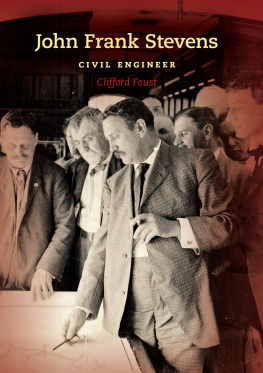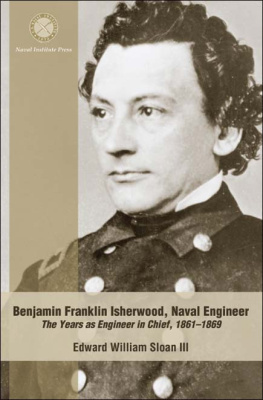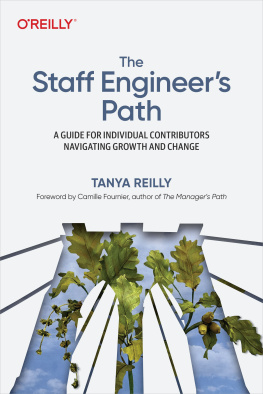RAILROADS PAST AND PRESENT
George M. Smerk, Editor
A list of books in the series appears at the end of this volume.
This book is a publication of
INDIANA UNIVERSITY PRESS
Office of Scholarly Publishing
Herman B Wells Library 350
1320 East 10th Street
Bloomington, Indiana 47405 USA
iupress.indiana.edu
Telephone orders 800-842-6796
Fax orders 812-855-7931
2013 by Clifford Foust
All rights reserved
No part of this book may be reproduced or utilized in any form or by any means, electronic or mechanical, including photocopying and recording, or by any information storage and retrieval system, without permission in writing from the publisher. The Association of American University Presses Resolution on Permissions constitutes the only exception to this prohibition.

The paper used in this publication meets the minimum requirements of the American National Standard for Information Sciences Permanence of Paper for Printed Library Materials, ANSI Z39.481992.
Manufactured in the
United States of America
Library of Congress
Cataloging-in-Publication Data
Foust, Clifford M., [date]
John Frank Stevens : civil engineer / Clifford Foust.
pages cm. (Railroads past and present)
Includes bibliographical references and index.
ISBN 978-0-253-01061-2 (cl : alk. paper) ISBN 978-0-253-01069-8 (eb) 1. Stevens, John F. (John Frank), 1853-1943. 2. Railroad engineers United States Biography. 3. Railroad engineering History. I. Title.
TF140.S755F68 2013
625.10092 dc23
[B]
2013010495
1 2 3 4 5 18 17 16 15 14 13
Preface
All of his adult life John Frank Stevens, in his words, embraced an irresistible urge to engineer. In the beginning it took the form of land surveying, which led to locating railroads in the heroic days of that world-changing transportation mode. In his senior years he contributed to engineering in a wide range of major projects, from railways to waterways and to much more.
While still very much alive and active, John Frank Stevens was called one of the greatest engineers in the world. Had that been literally true, it would have placed him in the company of Bell, Edison, Marconi, and Steinmetz, to name but a few of his time. To be sure, he had to his credit some of the great feats of railway reconnaissance, location, and construction in North America: the discovery of Marias Pass in the Rockies and Stevens Pass in the Cascades made possible the building of James J. Hills Great Northern westward from Havre, Montana, to Everett and Seattle. To that he added his pivotal Panama Canal contributions: the selection of a high lake and lock canal over a sea-level, tidal dam one, making him the Canals principal engineering genius. And as an aging man, he presided for more than five years over Manchurias Chinese Eastern Railway and for a short time over much of the Trans-Siberian Railway. Sandwiched between and around these feats he made an impact as builder and consultant on numerous of the most important engineering projects of his day, not only railroads but also the rescue of the Mississippi from the disastrous floods of 1927 and the building of the Boulder (Hoover) Dam, among others.
Yet in his day he was a larger-than-life figure in the era between the Civil War and the Great Depression, a time of Giants and Titans and of immense and expanding national confidence. It was a time that saw the dramatic growth of the nations power and sway and wealth, practical materialism and near-complete faith in progress, and the suppression of doubts. The railroad was one of the chief features and driving forces of that expanding power and hubris. John Frank Stevens flourished in that environment.
But along with his feats and superior judgment he also made some notable miscalculations and mistakes that provided him no little embarrassment. The most egregious of these was his decision to found in 1912 his own engineering/construction company in New York City. It didnt take long for it to become apparent to him and others that he was in over his head, and within a year and a half his firm went bankrupt, leading him to undertake to repay all creditors from his own earnings as consultant. And if his judgments on railway and Panama Canal issues seem now to have been little short of gifted, he came out on the minority side a number of times, such as, for example, on control of Mississippi floods and the building of the Boulder (Hoover) Dam.
He was a man of contradiction and of conflicting stimuli. From his unpretentious, rural origins in Maine, he took both muted pride and occasional embarrassment. Late in life he researched his family genealogy deeply enough to satisfy himself (and his sons, he hoped) that they could trace themselves back to the Mayflower, to one Henry Sam(p)son. By his own admission he gave priority to his work, his career, and required all else, including his family, to accommodate to this choice. Throughout much of his life he struggled with self-esteem when in company of the powerful, well educated, and supremely confident. Not a few times did he turn his back on them or lash out petulantly. He both admired and despised them. Though he usually kept his temper, when his wrath mounted and the governor broke, he exploded like a bursting boiler of a steam locomotive.
A quintessential man of Americas heroic age, he relied on the strength of will and sharp focus, often seen in the great barons of business and government of his time. He nearly always favored private enterprise and a clearly delineated hierarchical organizational structure under the leadership of a single decision-making individual. Yet at crucial times on major projects he distrusted the free market and non-governmental organizations to accomplish the tasks, most notably in building the Panama Canal. He was a lifelong Republican but by the early years of the twentieth century, as he succeeded in his career, came to distrust many of the GOPs standard bearers, most notably the progressive Theodore Roosevelt.
In his private life he was a devoted husband and father of three surviving sons, but he suffered disappointment with all three, although more often than not he was an absentee father and even when at home was dedicated to his work. At the same time he harbored great expectations for each and every one of them. He would have liked all of them to succeed in a civil engineering course in a distinguished university; none could satisfy his aspirations. Still, as the years went by, he found accommodation with the choices of all three and reveled in grandchildren.
John Frank came to yearn for a high railway office that would carry recognition of his accomplishments and, at the same time, wrestled with inner drives that made him impatient for it yet uncomfortable in campaigning openly for it. Like many of his era he expected that quiet, diligent, and productive work would lead to recognition and reward by the exalted men above him; he need not plead for them. Although raised in a slow-moving and slow-changing countryside, he was peripatetic as an adult; he could not abide long being chained to a desk or, for that matter, a particular locale for more than a few years at most. Much like one of his real-life heroes, Theodore Roosevelt (TR), he grew from a young beanpole to a man almost universally judged to be rugged and strong. Even when he sharply disagreed with him, Stevens did not waver in his very high regard for him as a fearless and stalwart man. (Much the same can be said for his admiration for James J. Hill.) Like Roosevelt he could be decisive, even obstinate, although on occasion profoundly wrong. Like Roosevelt he loved the outdoor life and measured himself by the lives of outdoor men. In most matters his youthful background was a poor predictor of his mature deportment. Unlike Roosevelt, the spoon in his baby mouth was pewter, not silver.







 The paper used in this publication meets the minimum requirements of the American National Standard for Information Sciences Permanence of Paper for Printed Library Materials, ANSI Z39.481992.
The paper used in this publication meets the minimum requirements of the American National Standard for Information Sciences Permanence of Paper for Printed Library Materials, ANSI Z39.481992.